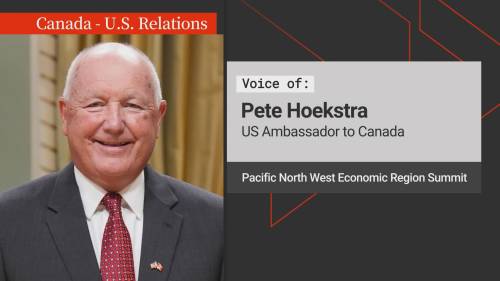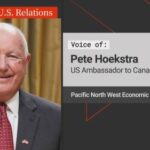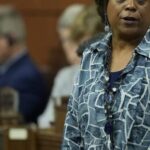In a spirited defense of Canadian trade practices, British Columbia Premier David Eby has fired back at recent characterizations made by U.S. Ambassador to Canada David Cohen, who described Canada as “mean and nasty” in trade negotiations. The diplomatic tension emerges amid ongoing discussions about softwood lumber—a perennial friction point in Canada-U.S. trade relations.
“Keep it up,” Eby remarked with clear resolve during a press conference in Victoria yesterday. “If standing up for B.C. forest workers, if standing up for the Canadian economy, if standing up for our forest-dependent communities means that we’re ‘mean and nasty,’ then we should keep being mean and nasty.”
The premier’s comments came in direct response to Ambassador Cohen’s statements made during an economic forum last week, where the American diplomat expressed frustration with what he characterized as Canada’s hard-nosed approach to trade negotiations, particularly regarding softwood lumber exports.
Trade analysts note this verbal sparring represents more than mere diplomatic rhetoric. The softwood lumber dispute has strained bilateral relations for decades, with the U.S. repeatedly imposing duties on Canadian lumber exports, claiming they are unfairly subsidized by provincial governments—a charge Canadian officials consistently reject.
“The reality is that we have won repeatedly at international tribunals that have found that our lumber is not unfairly subsidized,” Eby emphasized. “The Americans continue to charge tariffs because it benefits their lumber producers to do so, not because it’s the right thing to do.”
Economic data supports Eby’s assertion. The Canada-U.S. trading relationship, valued at approximately $2.6 billion daily, remains North America’s largest bilateral trade partnership despite these periodic tensions. Forestry exports alone contribute roughly $43 billion annually to the Canadian economy and support over 200,000 direct jobs across the country.
Dr. Marissa Chen, professor of international trade at the University of Toronto, offers context: “What we’re seeing is typical of the Canada-U.S. relationship—public posturing alongside pragmatic behind-the-scenes negotiations. Both sides understand the fundamental importance of maintaining strong economic ties despite specific sectoral disagreements.”
The dispute occurs against a broader backdrop of trade uncertainty, with the upcoming U.S. presidential election potentially signaling shifts in North American trade policy. Canadian officials across political lines have emphasized the need for a unified approach when dealing with their largest trading partner.
For communities across British Columbia, where forestry remains a cornerstone industry, the outcome of these negotiations carries significant implications. Industry representatives note that American duties have forced several mill closures in recent years, particularly in smaller communities where alternative employment opportunities are limited.
As both nations navigate this latest diplomatic rough patch, a fundamental question emerges: Can Canada and the United States find a sustainable resolution to the softwood lumber dispute that honors both free trade principles and the economic realities of communities dependent on this vital resource?























